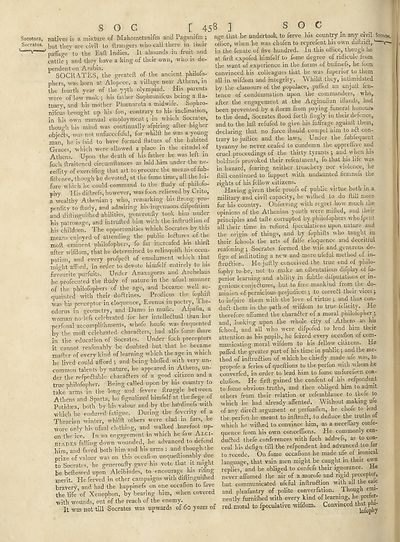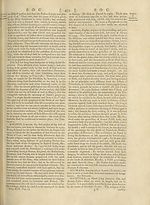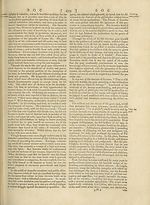Encyclopaedia Britannica, or, a Dictionary of arts, sciences, and miscellaneous literature : enlarged and improved. Illustrated with nearly six hundred engravings > Volume 19, Scripture-SUG
(504) Page 458
Download files
Complete book:
Individual page:
Thumbnail gallery: Grid view | List view

s o c
[ 453 ]
s o c
Socotora,
Socrates.
natives is a mixture of Mahometanifm and Paganifm j
but they are civil to ftrangers \vho call there in their
' paffage to the Eaft Indies. It abounds in fruit and
cattle •, and they have a king of their own, who is de¬
pendent on Arabia.
SOCRATES, the greateft of the ancient philofo-
phers, tvas born at Alopece, a village near Athens, in
the fourth year of the 77th olympiad. His parents
were of low rank *, his father Sophronifcus being a ita-
tuary, and his mother Pheenareta a midwife. Sophro¬
nifcus brought up his fon, Contrary to his inclination,
in his own manual employment } in which Socrates,
though his mind was continually afpiring after higher
objedls, was not unfuccefsful, lor whilft he was a young
man, he is laid to have formed ftatues of the habited
Graces, which were allowed a place in the citadel of
Athens. Upon the death of his father he was left in
fuch ftraitened circumftanees as laid him under the ne-
ceffity of exercifing that art to procure the means of fub-
filienee, though he devoted, at the fame time, all the ki-
fure which he could command to the ftudy of philofo-
phy His dill refs, however, was foon relieved by Crito,
a wealthy Athenian j who, remarking his tfrong pro-
penlity to finely, and admiring his ingenuous difpofition
and didmguiflred abilities, generoufly took him under
his patronage, and intruded him with the in ill ml ion of
his children. The opportunities which Socrates by this
means enjoyed of attending the public kclures of the
mod eminent philofophers, fo far increafed his third
after wifdom, that he determined to relinquifh his occu¬
pation, and every profpeil of emolument which that
raight’afford, in order to devote himfelf entirely to his
favourite purfuits. Under Anaxagoras and Archelaus
he prufecuted the dudy of nature in the ufual manner
of the philofophers of the age, and became well ac¬
quainted with their doarines. Prodxcus the fophid
was his preceptor in eloquence, Evenus in poetry, 1 he-
odorus in geometry, and Damo in mulic. Afpafia, a
woman no lefs celebrated for her intelkaual than her
per fon al accomplithments, whofe houfe was frequented
by the mod celebrated charaaers, had alfo lome lhare
in the education of Socrates. Under fuch preceptors
it cannot reafonably be doubted but that he. became
mailer of every kind of learning which the age in which
he lived could afford ; and being bleffed with very un¬
common talents by nature, be appeared in Athens, un¬
der the refpeaabk charaaers of a good citizen and a
true philofopher. Being called upon by his country to
take arms in the long and fevere druggie between
Athens and Sparta, be fignalized himfelf at the fiege.of
Potid-cea, both by Ids valour and by the ha'rdinefs with
which he endured fatigue. During the feyerity of a
Thracian winter, whild others were clad in furs, he
wore only his ufual clothing, and walked barefoot up¬
on the ice. In an engagement in which he faw AlXI-
BIADES falling down wounded, he advanced to defend
him, and faved both him and his arms : and though the
prize of valour was on this occafnm unquedionably due
to Socrates, he generoudy gave his vote that it might
be bedowed upon Aleibiades, to encourage nis riling
merit. Heferved in other campaigns with didinguiihed
bravery, and bad the happinefs on one occafion to fave
the life of Xenophon, by bearing him, when covered
with wounds, out of the reach of the enemy.
It was not till Socrates was upwards of 60 years oi
age that he undertook to ferve his country in any civil Socrates,,
office, when he was chofen to reprefent his own didridl,1 r-
in the fenate of five hundred. In this office, though lie
at fird expofed himfalf to fome degree of ridicule from
the want of experience in the forms ot bulinefs, he loon
convinced his colleagues that he was fuperior to them
all in wifdom and integrity. Whild they, intimidated
by the clamours of the populace, paffed an unjud ien-
tenee of condemnation upon the commanders, who,
after the engagement at the Arginufian iilands, had
been prevented by a dorm from paying funeral honour*
to the dead, Socrates dood forth fingly in their defence,
and to the lad refufed to give his fuffrage againd them,
declaring that no force thould compel him to a£l con¬
trary to judice and the laws. Under the fubiequent
tyranny he never ceafed to condemn the oppreilive and
cruel proceedings of the thirty tyrants j and when his
boldnefs provoked their refentment, fo that his life was
in hazard, fearing neither treachery nor violence, he
dill continued to liipport with undaunted firmnels the
rights of his fellow citizens.
Having given thefe proofs of public virtue both in a
military and civil capacity, he wilhed to do dill more
for his country. Obl'erving with regret how much the
opinions of the Athenian youth were nulled, and iljeir
principles and tade corrupted by philofophers who fpi nt
all their time in refined fpeculations upon nature and
the origin of things, and by fophids who taught in
their fehools the arts of falfe eloquence and deceitful
reafoning , Socrates formed the wife and generous de-
fign of inilituting a new and more ufeful method of in-
druftion. He jutlly conceived the true end of philo-
fophy to be, not to make an odentatious difplay oi Su¬
perior learning and ability in fuDtle deputations or in¬
genious conjeftures, but to free mankind from the do¬
minion of pernicious prejudices j to correU their vices j
to infpire them with the love of virtue j and thus con-
du£l them in the path of wifdom to true felicity. He
therefore affumed the character of a moral philofopher,;
and, looking upon the whole city of Athens as Ins
fchool, and all who were difpofod to lend him their
attention as his pupils, he feized every occafion of com¬
municating moral wifdom to his fellow citizens. He
palled the greater part of his time in public; and the me¬
thod of indrudlion of which he chiefly made ufe was, to
propofe a Series of quedions to the perfon with whom he
converfed, in order to lead him to fome unforefeen con-
clufion. He fird gained the confent of his. refpondent
to fome obvious truths, and then obliged him to admit
others from their relation or refemblance to thofe to
which he had already aflented. Without making ufe
of any direef argument or perfuafion, he chofe to lead
the perfon he meant to indraft, to deduce the truths of
which he wilhed to convince him, as a neceffary confe-
quence from his own coneeflions. He commonly con-
dufted thefe conferences with fuch addrefs, as to con¬
ceal his defign till the refpondent had advanced, too.far
to recede. On fome occafions he made ufe of ironical
language, that vain men might be caught in their own
replies* and be obliged to confefs their ignorance. He
never affumed the air of a morofe and rigid preceptor,
but communicated ufeful indruftion with all the eaie
and pleafantry of polite converfation. Though emi¬
nently furnilhed with every kind of learning, he prefer¬
red moral to Speculative wifdom. Convinced that phi-
[ 453 ]
s o c
Socotora,
Socrates.
natives is a mixture of Mahometanifm and Paganifm j
but they are civil to ftrangers \vho call there in their
' paffage to the Eaft Indies. It abounds in fruit and
cattle •, and they have a king of their own, who is de¬
pendent on Arabia.
SOCRATES, the greateft of the ancient philofo-
phers, tvas born at Alopece, a village near Athens, in
the fourth year of the 77th olympiad. His parents
were of low rank *, his father Sophronifcus being a ita-
tuary, and his mother Pheenareta a midwife. Sophro¬
nifcus brought up his fon, Contrary to his inclination,
in his own manual employment } in which Socrates,
though his mind was continually afpiring after higher
objedls, was not unfuccefsful, lor whilft he was a young
man, he is laid to have formed ftatues of the habited
Graces, which were allowed a place in the citadel of
Athens. Upon the death of his father he was left in
fuch ftraitened circumftanees as laid him under the ne-
ceffity of exercifing that art to procure the means of fub-
filienee, though he devoted, at the fame time, all the ki-
fure which he could command to the ftudy of philofo-
phy His dill refs, however, was foon relieved by Crito,
a wealthy Athenian j who, remarking his tfrong pro-
penlity to finely, and admiring his ingenuous difpofition
and didmguiflred abilities, generoufly took him under
his patronage, and intruded him with the in ill ml ion of
his children. The opportunities which Socrates by this
means enjoyed of attending the public kclures of the
mod eminent philofophers, fo far increafed his third
after wifdom, that he determined to relinquifh his occu¬
pation, and every profpeil of emolument which that
raight’afford, in order to devote himfelf entirely to his
favourite purfuits. Under Anaxagoras and Archelaus
he prufecuted the dudy of nature in the ufual manner
of the philofophers of the age, and became well ac¬
quainted with their doarines. Prodxcus the fophid
was his preceptor in eloquence, Evenus in poetry, 1 he-
odorus in geometry, and Damo in mulic. Afpafia, a
woman no lefs celebrated for her intelkaual than her
per fon al accomplithments, whofe houfe was frequented
by the mod celebrated charaaers, had alfo lome lhare
in the education of Socrates. Under fuch preceptors
it cannot reafonably be doubted but that he. became
mailer of every kind of learning which the age in which
he lived could afford ; and being bleffed with very un¬
common talents by nature, be appeared in Athens, un¬
der the refpeaabk charaaers of a good citizen and a
true philofopher. Being called upon by his country to
take arms in the long and fevere druggie between
Athens and Sparta, be fignalized himfelf at the fiege.of
Potid-cea, both by Ids valour and by the ha'rdinefs with
which he endured fatigue. During the feyerity of a
Thracian winter, whild others were clad in furs, he
wore only his ufual clothing, and walked barefoot up¬
on the ice. In an engagement in which he faw AlXI-
BIADES falling down wounded, he advanced to defend
him, and faved both him and his arms : and though the
prize of valour was on this occafnm unquedionably due
to Socrates, he generoudy gave his vote that it might
be bedowed upon Aleibiades, to encourage nis riling
merit. Heferved in other campaigns with didinguiihed
bravery, and bad the happinefs on one occafion to fave
the life of Xenophon, by bearing him, when covered
with wounds, out of the reach of the enemy.
It was not till Socrates was upwards of 60 years oi
age that he undertook to ferve his country in any civil Socrates,,
office, when he was chofen to reprefent his own didridl,1 r-
in the fenate of five hundred. In this office, though lie
at fird expofed himfalf to fome degree of ridicule from
the want of experience in the forms ot bulinefs, he loon
convinced his colleagues that he was fuperior to them
all in wifdom and integrity. Whild they, intimidated
by the clamours of the populace, paffed an unjud ien-
tenee of condemnation upon the commanders, who,
after the engagement at the Arginufian iilands, had
been prevented by a dorm from paying funeral honour*
to the dead, Socrates dood forth fingly in their defence,
and to the lad refufed to give his fuffrage againd them,
declaring that no force thould compel him to a£l con¬
trary to judice and the laws. Under the fubiequent
tyranny he never ceafed to condemn the oppreilive and
cruel proceedings of the thirty tyrants j and when his
boldnefs provoked their refentment, fo that his life was
in hazard, fearing neither treachery nor violence, he
dill continued to liipport with undaunted firmnels the
rights of his fellow citizens.
Having given thefe proofs of public virtue both in a
military and civil capacity, he wilhed to do dill more
for his country. Obl'erving with regret how much the
opinions of the Athenian youth were nulled, and iljeir
principles and tade corrupted by philofophers who fpi nt
all their time in refined fpeculations upon nature and
the origin of things, and by fophids who taught in
their fehools the arts of falfe eloquence and deceitful
reafoning , Socrates formed the wife and generous de-
fign of inilituting a new and more ufeful method of in-
druftion. He jutlly conceived the true end of philo-
fophy to be, not to make an odentatious difplay oi Su¬
perior learning and ability in fuDtle deputations or in¬
genious conjeftures, but to free mankind from the do¬
minion of pernicious prejudices j to correU their vices j
to infpire them with the love of virtue j and thus con-
du£l them in the path of wifdom to true felicity. He
therefore affumed the character of a moral philofopher,;
and, looking upon the whole city of Athens as Ins
fchool, and all who were difpofod to lend him their
attention as his pupils, he feized every occafion of com¬
municating moral wifdom to his fellow citizens. He
palled the greater part of his time in public; and the me¬
thod of indrudlion of which he chiefly made ufe was, to
propofe a Series of quedions to the perfon with whom he
converfed, in order to lead him to fome unforefeen con-
clufion. He fird gained the confent of his. refpondent
to fome obvious truths, and then obliged him to admit
others from their relation or refemblance to thofe to
which he had already aflented. Without making ufe
of any direef argument or perfuafion, he chofe to lead
the perfon he meant to indraft, to deduce the truths of
which he wilhed to convince him, as a neceffary confe-
quence from his own coneeflions. He commonly con-
dufted thefe conferences with fuch addrefs, as to con¬
ceal his defign till the refpondent had advanced, too.far
to recede. On fome occafions he made ufe of ironical
language, that vain men might be caught in their own
replies* and be obliged to confefs their ignorance. He
never affumed the air of a morofe and rigid preceptor,
but communicated ufeful indruftion with all the eaie
and pleafantry of polite converfation. Though emi¬
nently furnilhed with every kind of learning, he prefer¬
red moral to Speculative wifdom. Convinced that phi-
Set display mode to:
![]() Universal Viewer |
Universal Viewer | ![]() Mirador |
Large image | Transcription
Mirador |
Large image | Transcription
Images and transcriptions on this page, including medium image downloads, may be used under the Creative Commons Attribution 4.0 International Licence unless otherwise stated. ![]()
| Permanent URL | https://digital.nls.uk/192701834 |
|---|
| Attribution and copyright: |
|
|---|
| Description | Ten editions of 'Encyclopaedia Britannica', issued from 1768-1903, in 231 volumes. Originally issued in 100 weekly parts (3 volumes) between 1768 and 1771 by publishers: Colin Macfarquhar and Andrew Bell (Edinburgh); editor: William Smellie: engraver: Andrew Bell. Expanded editions in the 19th century featured more volumes and contributions from leading experts in their fields. Managed and published in Edinburgh up to the 9th edition (25 volumes, from 1875-1889); the 10th edition (1902-1903) re-issued the 9th edition, with 11 supplementary volumes. |
|---|---|
| Additional NLS resources: |
|

